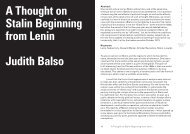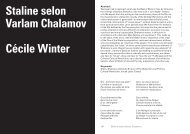Reflections on the Meaning of Stalinism Paul Le Blanc
blanc
blanc
Create successful ePaper yourself
Turn your PDF publications into a flip-book with our unique Google optimized e-Paper software.
those <strong>of</strong> internati<strong>on</strong>al Socialism.” 10<br />
This two-steps-removed-from-Marxism approach, <strong>of</strong> course, had<br />
implicati<strong>on</strong>s for <strong>the</strong> Communist Internati<strong>on</strong>al which <strong>Le</strong>nin, Trotsky,<br />
Zinoviev, and <strong>the</strong> o<strong>the</strong>r Bolsheviks had established in 1919. The original<br />
purpose was to create str<strong>on</strong>g Communist parties in all countries, to help<br />
advance <strong>the</strong> world revoluti<strong>on</strong> that was required for a brighter future for<br />
workers and <strong>the</strong> oppressed across <strong>the</strong> face <strong>of</strong> <strong>the</strong> planet, also for <strong>the</strong><br />
survival <strong>of</strong> <strong>the</strong> new Soviet Republic, and for <strong>the</strong> realizati<strong>on</strong> <strong>of</strong> genuine<br />
socialism. The first four world c<strong>on</strong>gresses <strong>of</strong> what became known as<br />
<strong>the</strong> Comintern were annual ga<strong>the</strong>rings – 1919, 1920, 1921, 1922 – and,<br />
whatever <strong>the</strong>ir limitati<strong>on</strong>s, brought toge<strong>the</strong>r dedicated revoluti<strong>on</strong>aries<br />
who did impressive work. But <strong>the</strong> “socialism in <strong>on</strong>e country” perspective<br />
increasingly subordinated <strong>the</strong> Comintern to <strong>the</strong> status <strong>of</strong> being a tool in<br />
Soviet foreign policy, leading to what historian E. H. Carr referred to as<br />
<strong>the</strong> “twilight <strong>of</strong> <strong>the</strong> Comintern.” Even so, <strong>the</strong> Stalin regime c<strong>on</strong>tinued<br />
to c<strong>on</strong>trol and make use <strong>of</strong> Communist parties <strong>of</strong> various countries in<br />
<strong>the</strong> game <strong>of</strong> global power politics. Vitorio Vidali – dedicated Italian<br />
Communist, serving in Spain under <strong>the</strong> name “C<strong>on</strong>treras” as a highly<br />
placed figure in Internati<strong>on</strong>al Brigades, for some years engaged in<br />
sometimes dubious “internati<strong>on</strong>al work” – would recall a highly placed<br />
comrade from <strong>the</strong> USSR telling him: “We must be very, very wily. . . . D<strong>on</strong>’t<br />
forget that word even in <strong>the</strong> most difficult moments. We must be openminded<br />
and wily.” Vidali c<strong>on</strong>nected this “wily” advice with “a “‘<strong>the</strong>ory’<br />
c<strong>on</strong>cerning <strong>the</strong> ‘usefulness’ <strong>of</strong> people, <strong>of</strong> <strong>the</strong> masses,” positing that “even<br />
a movement can be c<strong>on</strong>sidered useful or useless. As l<strong>on</strong>g as it remains<br />
useful, it is utilized; when it no l<strong>on</strong>ger serves it purpose it is rejected, or<br />
suffocated, or destroyed.” And he recalled, “I stood <strong>the</strong>re with a nasty<br />
taste in my mouth.” 11<br />
The actual relati<strong>on</strong> <strong>of</strong> <strong>Le</strong>ninism to <strong>Stalinism</strong> is also suggested<br />
if we turn our attenti<strong>on</strong> to Nadezhda Krupskaya’s essential text,<br />
Reminiscences <strong>of</strong> <strong>Le</strong>nin. In c<strong>on</strong>trast to <strong>the</strong> rigid definiti<strong>on</strong> proposed by<br />
Stalin – that “<strong>Le</strong>ninism is Marxism in <strong>the</strong> epoch <strong>of</strong> imperialism and <strong>of</strong> <strong>the</strong><br />
proletarian revoluti<strong>on</strong>” 12 – Krupskaya presents us with <strong>the</strong> approach and<br />
ideas and practices actually developed by <strong>Le</strong>nin in <strong>the</strong> course <strong>of</strong> his life<br />
as a revoluti<strong>on</strong>ary activist, engaged in <strong>the</strong> struggle to end all oppressi<strong>on</strong><br />
and exploitati<strong>on</strong> through <strong>the</strong> revoluti<strong>on</strong>ary struggle <strong>of</strong> <strong>the</strong> working class<br />
for democracy and socialism. “The role <strong>of</strong> democracy in <strong>the</strong> struggle for<br />
socialism could not be ignored,” she emphasized. “By 1915-1916 Vladimir<br />
Ilyich had g<strong>on</strong>e deep into <strong>the</strong> questi<strong>on</strong> <strong>of</strong> democracy, which he examined<br />
in <strong>the</strong> light <strong>of</strong> socialist c<strong>on</strong>structi<strong>on</strong>.” She added: “The building up <strong>of</strong><br />
C<br />
R<br />
I<br />
S<br />
I<br />
S<br />
&<br />
C<br />
R<br />
I<br />
T<br />
I<br />
Q<br />
U<br />
E<br />
/<br />
Volume 3 /<br />
Issue 1<br />
socialism is not merely a matter <strong>of</strong> ec<strong>on</strong>omic c<strong>on</strong>structi<strong>on</strong>. Ec<strong>on</strong>omics<br />
is <strong>on</strong>ly <strong>the</strong> foundati<strong>on</strong> <strong>of</strong> socialist c<strong>on</strong>structi<strong>on</strong>, its basis and premise;<br />
<strong>the</strong> crux <strong>of</strong> socialist c<strong>on</strong>structi<strong>on</strong> lies in rec<strong>on</strong>structing <strong>the</strong> whole<br />
social fabric anew, rebuilding it <strong>on</strong> <strong>the</strong> basis <strong>of</strong> socialist revoluti<strong>on</strong>ary<br />
democratism.” She provided lengthy quotes from <strong>Le</strong>nin, this being <strong>on</strong>e <strong>of</strong><br />
<strong>the</strong> shorter <strong>on</strong>es:<br />
Socialism is impossible without democracy in two respects: 1. The<br />
proletariat cannot carry out a socialist revoluti<strong>on</strong> unless it is prepared for<br />
it by a struggle for democracy; 2. Victorious socialism cannot maintain<br />
its victory and bring humanity to <strong>the</strong> time when <strong>the</strong> state will wi<strong>the</strong>r away<br />
unless democracy is fully achieved. 13<br />
This understanding <strong>of</strong> “<strong>Le</strong>ninism” was <strong>of</strong> little use to a rising<br />
bureaucratic dictatorship that – out <strong>of</strong> <strong>the</strong> isolati<strong>on</strong> and erosi<strong>on</strong> <strong>of</strong> <strong>the</strong><br />
Russian Revoluti<strong>on</strong> – sought a dogmatic ideology to help reinforce<br />
its own increasingly unquesti<strong>on</strong>ed power as it ruthlessly sought to<br />
modernize backward Russia. The Stalinist evaluati<strong>on</strong> <strong>of</strong> Krupskaya<br />
has been helpfully clarified by <strong>on</strong>e <strong>of</strong> Stalin’s closest associates, V. M.<br />
Molotov:<br />
Krupskaya followed <strong>Le</strong>nin all her life, before and after <strong>the</strong><br />
Revoluti<strong>on</strong>. But she understood nothing about politics. Nothing. . .<br />
. In 1925 she became c<strong>on</strong>fused and followed [Gregory] Zinoviev. And<br />
Zinoviev took an anti-<strong>Le</strong>ninist positi<strong>on</strong>. Bear in mind that it was not<br />
so simple to be a <strong>Le</strong>ninist! . . . Stalin regarded her unfavorably. She<br />
turned out to be a bad communist. . . . What <strong>Le</strong>nin wrote about Stalin’s<br />
rudeness [when he proposed Stalin’s removal as <strong>the</strong> Communist Party’s<br />
General Secretary] was not without Krupskaya’s influence. . . . Stalin<br />
was irritated: “Why should I get up <strong>on</strong> my hind legs for her? To sleep with<br />
<strong>Le</strong>nin does not necessarily mean to understand <strong>Le</strong>ninism!” . . . In <strong>the</strong> last<br />
analysis, no <strong>on</strong>e understood <strong>Le</strong>ninism better than Stalin. 14<br />
Krupskaya, a committed Marxist since <strong>the</strong> mid-1890s when she was<br />
in her early twenties, was not <strong>on</strong>ly “an active militant” throughout two<br />
decades <strong>of</strong> exile, but was <strong>Le</strong>nin’s “collaborator in every circumstance” (as<br />
<strong>the</strong> esteemed historian <strong>of</strong> internati<strong>on</strong>al socialism, Georges Haupt, has<br />
observed) and “above all <strong>the</strong> c<strong>on</strong>fidante <strong>of</strong> <strong>the</strong> founder <strong>of</strong> Bolshevism.” 15<br />
Krupskaya’s Reminiscences <strong>of</strong> <strong>Le</strong>nin, which suffered disfigurement<br />
from having to be composed and published amid <strong>the</strong> growing intolerance<br />
and repressi<strong>on</strong> <strong>of</strong> <strong>the</strong> Stalin regime, n<strong>on</strong>e<strong>the</strong>less holds up well as an<br />
C<br />
R<br />
I<br />
S<br />
I<br />
S<br />
&<br />
C<br />
R<br />
I<br />
T<br />
I<br />
Q<br />
U<br />
E<br />
/<br />
Volume 3 /<br />
Issue 1<br />
10 Duranty 1935, pp. 262, 274.<br />
13 Krupskaya 1979, pp. 328-330.<br />
11 Vidali 1984, p. 155; Riddell 1987-2016; James 1993; Carr 1982; Claudin 1975.<br />
14 Molotov and Chuev 1993, pp. 131, 132, 133.<br />
12 Stalin 1976, p. 3.<br />
15 Haupt and Marie 1974, p. 157.<br />
88 <str<strong>on</strong>g>Reflecti<strong>on</strong>s</str<strong>on</strong>g> <strong>on</strong> <strong>the</strong> <strong>Meaning</strong> <strong>of</strong> <strong>Stalinism</strong><br />
89<br />
<str<strong>on</strong>g>Reflecti<strong>on</strong>s</str<strong>on</strong>g> <strong>on</strong> <strong>the</strong> <strong>Meaning</strong> <strong>of</strong> <strong>Stalinism</strong>






